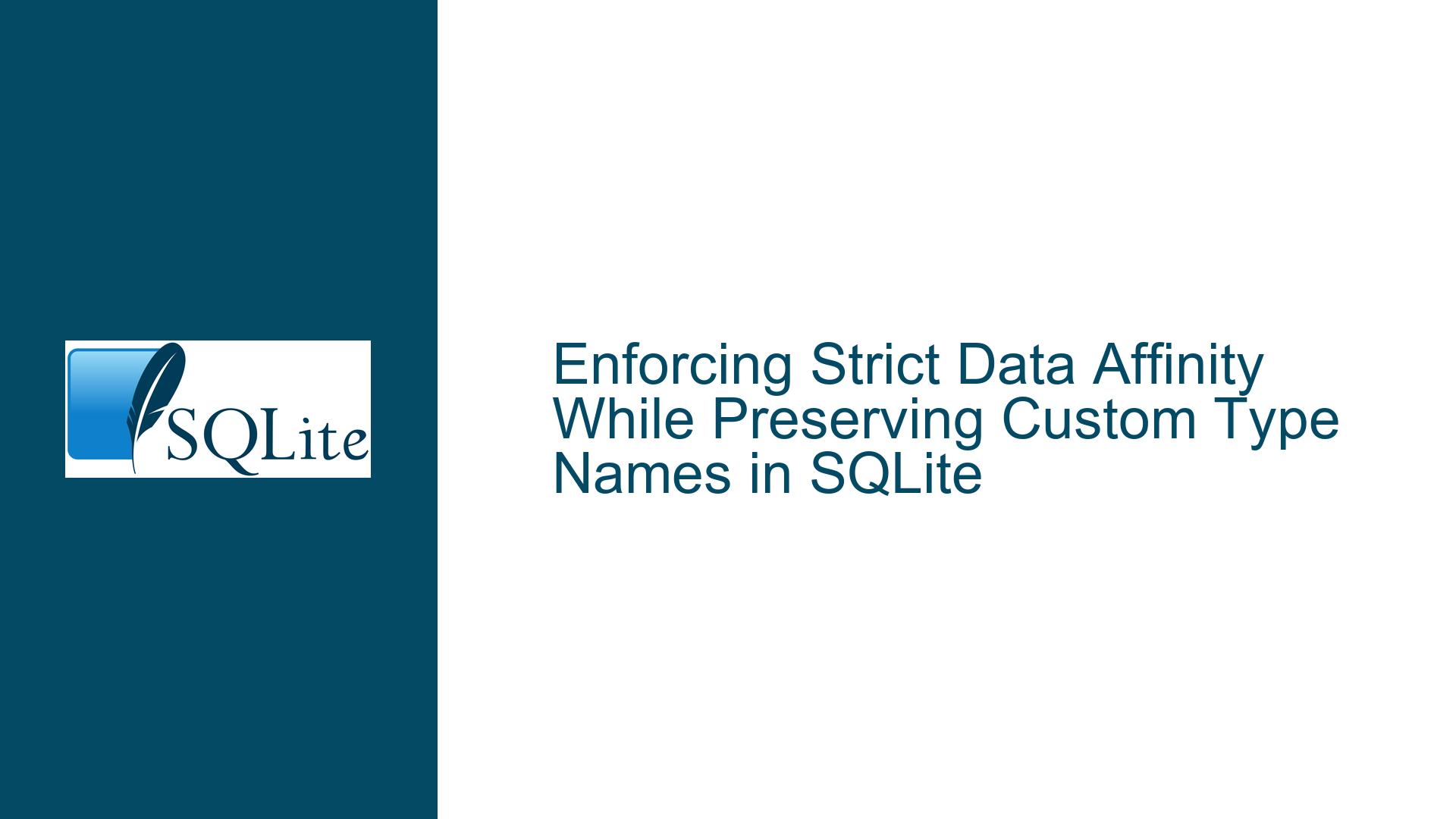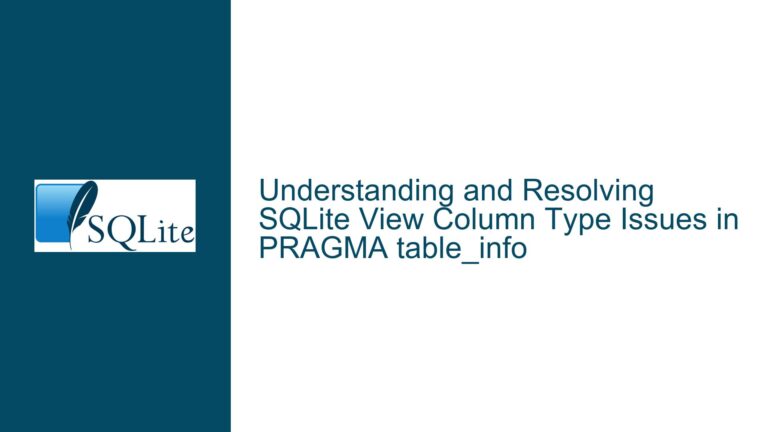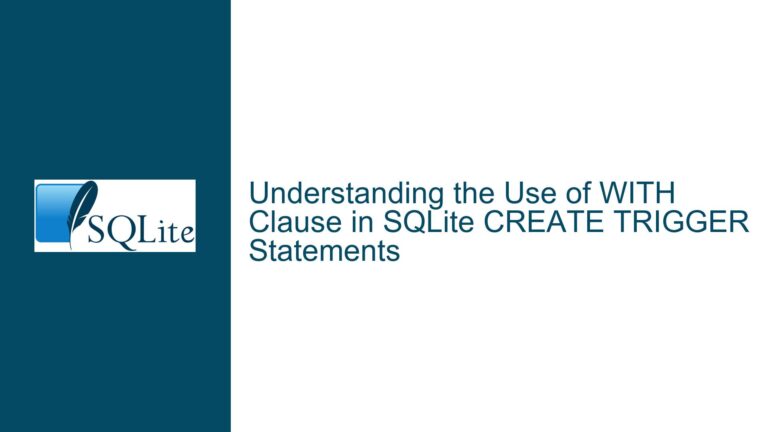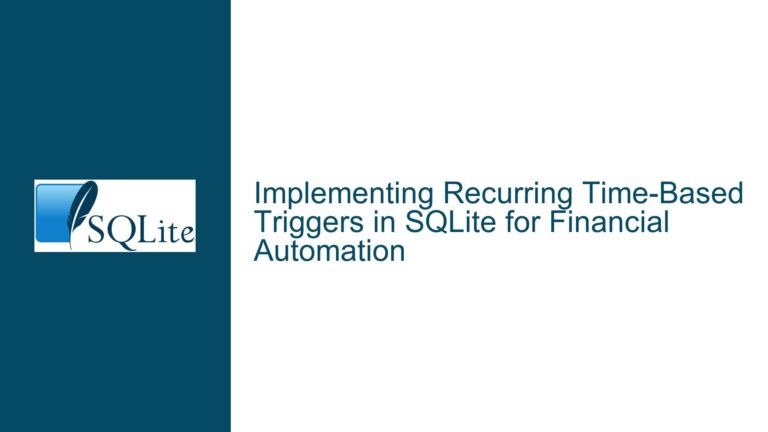Enforcing Strict Data Affinity While Preserving Custom Type Names in SQLite
Understanding the Conflict Between Strict Tables and Custom Type Annotations
The core challenge revolves around SQLite’s STRICT table feature, which enforces strict data type affinity but simultaneously restricts the allowable column type names to a predefined set (INT, INTEGER, REAL, TEXT, BLOB, ANY). This restriction prevents developers from using custom or extended type names (e.g., BOOLEAN, DATETIME, JSON) in column definitions while still enforcing strict data validation. The conflict arises when applications rely on metadata queries like PRAGMA table_info to infer domain-specific types for application-layer mapping (e.g., translating a BOOLEAN-annotated column to a native boolean type in a programming language). Strict tables erase this metadata by coercing all type names to the restricted set, thereby breaking type-sensitive application logic.
Root Causes of Metadata Loss in Strictly Typed Columns
1. Conflation of Type Affinity Enforcement and Type Name Restrictions
SQLite’s STRICT tables combine two distinct behaviors:
- Affinity Enforcement: Values inserted into columns must match the declared affinity (INTEGER, TEXT, etc.). For example, inserting a string into an INTEGER column triggers an error.
- Type Name Restriction: Only specific keywords are allowed in column definitions. Using non-standard names (e.g., BOOLEAN) in a
STRICTtable results in a schema parsing error.
This design conflates data validation with schema metadata, forcing developers to choose between strict data integrity and expressive type annotations. The underlying rationale is to prevent ambiguity in type declarations (e.g., VARCHAR(255) vs. TEXT), but it inadvertently limits use cases where type names serve as application-layer hints.
2. Reliance on PRAGMA table_info for Application-Type Mapping
Applications often query PRAGMA table_info to retrieve column declarations, including the original type names. For non-strict tables, developers can declare columns with arbitrary type names (e.g., is_active BOOLEAN), and these names are preserved in the type field of the pragma’s output. Strict tables strip this metadata, replacing BOOLEAN with INTEGER. This breaks systems that map SQL columns to language-specific types (e.g., Python’s bool) based on declared type names.
3. Absence of User-Defined Type Aliases
SQLite lacks a native mechanism to define type aliases (e.g., mapping BOOLEAN to INTEGER with a constraint). While check constraints can enforce domain-specific rules (e.g., CHECK (is_active IN (0, 1))), they do not propagate type metadata to PRAGMA table_info or sqlite3_column_decltype(). This forces developers to either forgo strict tables or maintain external metadata (e.g., a separate table listing custom types), complicating schema management.
Resolving the Conflict: Strategies for Strict Affinity with Custom Metadata
1. Hybrid Schema Design: Strict Tables with Auxiliary Metadata
Create a strict table for data integrity and a companion table or view to store custom type annotations.
Example:
-- Strict table with base affinities
CREATE TABLE users (
id INTEGER PRIMARY KEY,
is_active INTEGER, -- Maps to BOOLEAN
created_at TEXT -- Maps to DATETIME
) STRICT;
-- Metadata table for application-layer types
CREATE TABLE column_metadata (
table_name TEXT,
column_name TEXT,
app_type TEXT,
PRIMARY KEY (table_name, column_name)
);
INSERT INTO column_metadata VALUES
('users', 'is_active', 'BOOLEAN'),
('users', 'created_at', 'DATETIME');
Applications query both PRAGMA table_info and column_metadata to resolve application types. This decouples data validation from type metadata but requires maintaining two schemas.
2. Check Constraints as Domain-Specific Type Enforcers
Use check constraints to enforce domain rules while retaining custom type names in non-strict tables.
Example:
CREATE TABLE users (
id INTEGER PRIMARY KEY,
is_active BOOLEAN CHECK (is_active IN (0, 1)), -- Enforce boolean values
created_at DATETIME CHECK (datetime(created_at) IS NOT NULL)
) WITHOUT ROWID;
While this avoids strict tables, it ensures data integrity through constraints. The PRAGMA table_info will preserve BOOLEAN and DATETIME in the type column, allowing applications to map these names directly. However, this approach does not prevent invalid types (e.g., inserting a string into is_active if the string can be coerced to an integer).
3. Type Annotation via Comment Syntax or Column Aliases
Leverage SQL comments or column aliases to embed type hints without affecting the schema.
Example:
CREATE TABLE users (
id INTEGER PRIMARY KEY,
is_active INTEGER /* BOOLEAN */,
created_at TEXT /* DATETIME */
) STRICT;
Applications can parse column definitions (e.g., using sqlite3_schema or PRAGMA table_info) and extract types from comments. This is fragile but avoids schema modifications.
4. Custom SQLite Build with Extended Strict Type Parsing
Modify SQLite’s source code to allow extended type names in strict tables. In parse.y, adjust the column-def rule to permit arbitrary type names after validating the strict affinity.
Code Snippet (Conceptual):
// Original rule (simplified):
column_def: column_name typetoken [column_constraints]
// Modified rule:
column_def: column_name strict_typetoken [additional_typetokens] [column_constraints]
This would allow declarations like is_active BOOLEAN INTEGER STRICT, where BOOLEAN is a metadata annotation and INTEGER specifies the strict affinity. The sqlite3_column_decltype() function would return the full declaration (BOOLEAN INTEGER), allowing applications to split the affinity from the annotation.
5. Post-Processing PRAGMA table_info Output with Affinity Inference
Use SQLite’s runtime metadata to infer affinities and map them to custom types.
Example Workflow:
- Query
PRAGMA table_info(users)to get declared type names. - For strict tables, ignore the
typefield and instead infer affinity from the column’s storage. - Use a lookup table to map affinities to application types (e.g.,
INTEGERaffinity →BOOLEANif the column name starts withis_).
This requires heuristic-based logic and is error-prone but avoids schema changes.
Final Recommendations and Tradeoffs
- Immediate Fix: Use check constraints in non-strict tables for projects requiring custom type names. This balances data integrity with metadata preservation but sacrifices strict affinity enforcement.
- Long-Term Solution: Advocate for a SQLite fork or extension that decouples type affinity from declaration names in strict tables. Engage with the SQLite community via mailing lists or forums to propose syntax changes (e.g.,
CREATE TABLE ... STRICT(ALLOW_ANNOTATIONS)). - Workaround: Implement auxiliary metadata tables and integrate them into application schema handlers. This adds complexity but maintains strict data validation.
By decoupling the roles of type affinity (data validation) and type metadata (application semantics), developers can achieve both strict data integrity and rich type hinting without relying on non-standard SQL extensions.






